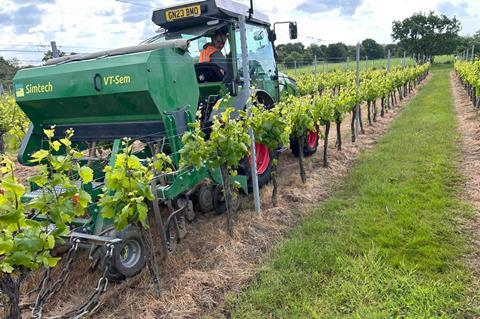Initiative will include the use of nautral plant protection and an acoustic data survey
A new research project to reduce carbon and increase biodiversity in UK vineyards will use cutting-edge technology to monitor the impact of its trials.

Funded by Growing Kent & Medway and led by Niab, the research project will see companion plants sown between the rows of vines to deter pests and attract beneficial insects.
As well as traditional sampling methods that visually count the number of insects in the plots, an acoustic data survey will capture the sounds of invertebrates living in the soils to monitor their numbers.
The research team will apply chitosan, a natural plant protection product, to the crop during the growing season to help boost the health of the soil and control plant diseases present in the vines. The team at Niab’s Wine Innovation Centre will test the impact of the companion planting and natural deterrents on the final quality of the grapes and wine.
The £50,000 research trial is one of six new projects recently funded by Growing Kent & Medway to advance sustainable innovation in UK plant-based food and farming.
Dr Belinda Kemp, who leads the Wine Innovation Centre at Niab, said: “Planting companion plants within the vineyard alleys will create beneficial associations between the flowers and the vines, enhancing the grapevines’ growth, health, and productivity.
“We are taking a holistic view of the vineyard management to reduce disease pressure, increase beneficial insects, decrease pests, and increase soil health in vineyards without impairing the grape juice and wine chemistry. We’re also using two types of chitosan (a mushroom-derived chitosan and one made from crustacean shells), which act as a biostimulant and biopesticide, helping to prevent vine mildew and rot vine infections.”
The trials will be undertaken at Niab’s East Malling Research vineyard and commercial wine producers Gusbourne Estate and Westwell Wine Estate in Kent. Phoebe French, communications manager and R&D lead at WineGB, said: “The proposal represents an important and timely endeavour that will help mitigate economic losses and increase the sustainable solutions to grape-growing challenges.
“This could drastically reduce the need for fungicide applications to prevent diseases in grapevines, by providing an environmentally sustainable strategy to reduce yield losses and maintain crop quality to support the UK wine production industry.”



